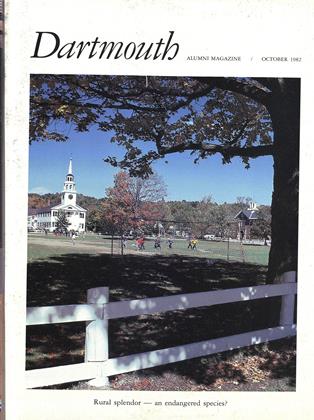Forever Young
"This Twenty-Five Year Book is dedicated to Seymour Doss Finoff, who will always be our youngest classmate." Just for a moment, when I came across those words in my odyssey through the shelf-full of mid-life chronicles, I failed to grasp their meaning. I was not expecting to find a memento mori among the strange mix of sentiments that attempt to capture and appraise several hundred quarter-centuries of life after Dartmouth. But, of course, the dedication to "our youngest classmate" forms just one more attempt to find a sliver of consolation in the face of the unspeakable mystery and mockery that attend upon the death of a youngster.
Laurence Binyon may have said it more eloquently in those lines I heard every Armistice Day when I was a lad They shall grow not oldAs we that are left grow old;Age shall not weary them,Nor the years condemn but he must have known as well as anyone else that no one in his right mind would refuse the weariness of age or the condemnation of the years if given the choice. We speak of how they will be forever young not because we think there is any virtue in it but because there is really so very little else even close to being worth saying.
That dedication and Binyon's words from the trenches came back to me when I went up to read the card at the foot of the flagpole from which the Dartmouth flag was flying at half-staff, and discovered that we were mourning the death of a member of the class of 1982. One who at commencement only two months earlier would have put his arms around his neighbors for the last occasion on which the whole class would be together to sing the alma mater had become in a split second of grotesque violence forever their youngest classmate.
The size and variousness of the congregation in Rollins for the memorial service says immediately that this is no ordinary loss. In telling of his dedication as a counselor for Headrest, of his newly launched career at the Children's Center, of his manifold contributions to the lives of his friends in Foley House, of his growth as a student, the speakers add to the awareness, which even one who never knew him is bound to sense, that his death was something unconscionable, outrageous in any terms of man's discerning.
His parents astonishingly, for their anguish is greatest of all are able to speak to us about him. They thank his friends and workmates for telling them what ordinarily they might never have come to know: just how remarkable a man their son was in the eyes of his contemporaries. They urge us to do anything we can in any sphere of influence to make it less likely that young lives will be wiped out. They remind us, by their bearing as well as their words, that there is always something worth going on for, even after the direst setback.
Twenty-Five Year Books are not the only things I have read in this summer of reacquainting myself with the Dartmouth mystery. I have read, too, a great deal in the writings of John Dickey. And I have marveled not only at his extraordinary command of words, but also, and so much more, at how he used those words always for a purpose, striving one can feel the struggle to bring them together in such a way that they will not, can not, as the wretched saying has it, go in one ear and out the other. Here are some words from his valedictory to the class that graduated 21 years before James Hoffman's:
"No one can share another's growth without having a part of himself irretrievably caught up in that other life. This is the law of the family, and so, too, is it the law of education. It is the, price of love the good parent pays; it is the price of an earthly immortality that the good teacher pays for having shared with you his learning, not merely his knowledge. The disengagement of teacher and student is necessary to education, but it is always just a little bit more incomplete than either of us knows, and that is where; for better or worse, the immortality creeps in."
Usually, of course, it is the good teachers who live on in the lives of their grateful students. Perhaps, though, there is something even more blessed when fate reverses the pattern and the good student, departed, lives on the lives of those teachers who had the grace to learn from him.
Valedictory
A principal aim of all the essays for In theWide, Wide "World has been to satisfy the amiable man and inspiring editor who asked me if I would like to try my hand at this kind of piece. He is leaving the Magazine, and this will be the last of the series.
 View Full Issue
View Full Issue
More From This Issue
-
 Feature
FeatureWHY STUDY WOMEN?
October 1982 By Mary Ellen Donovan -
 Feature
FeatureHome, Home on the Plain
October 1982 By Jeffrey Boffa -
 Feature
FeatureCan the Summer?
October 1982 By Shelby Grantham -
 Sports
SportsAn Irish Connection and a Quaker Shutout
October 1982 By Brad Hills '65 -
 Class Notes
Class Notes1982
October 1982 By John King -
 Article
ArticleSexagenarian Hiker Travels Light on the Appalachian Trail
October 1982 By D.C.G
Peter Smith
-
 Feature
FeatureQuestion: Who are the Arts for and, Indeed, Who Owns Dartmouth?
April 1981 By Peter Smith -
 Article
ArticleIn the Wide, Wide World
OCTOBER 1981 By Peter Smith -
 Article
ArticleAlms for Blissful Calm
SEPTEMBER 1982 By Peter Smith -
 Books
BooksWords of Wisdom
MAY 1984 By Peter Smith -
 Books
Books"One Man in His Time..."
JUNE/JULY 1984 By Peter Smith -
 Feature
Feature"Veni, Vidi, victus sum."
JUNE/JULY 1984 By Peter Smith








